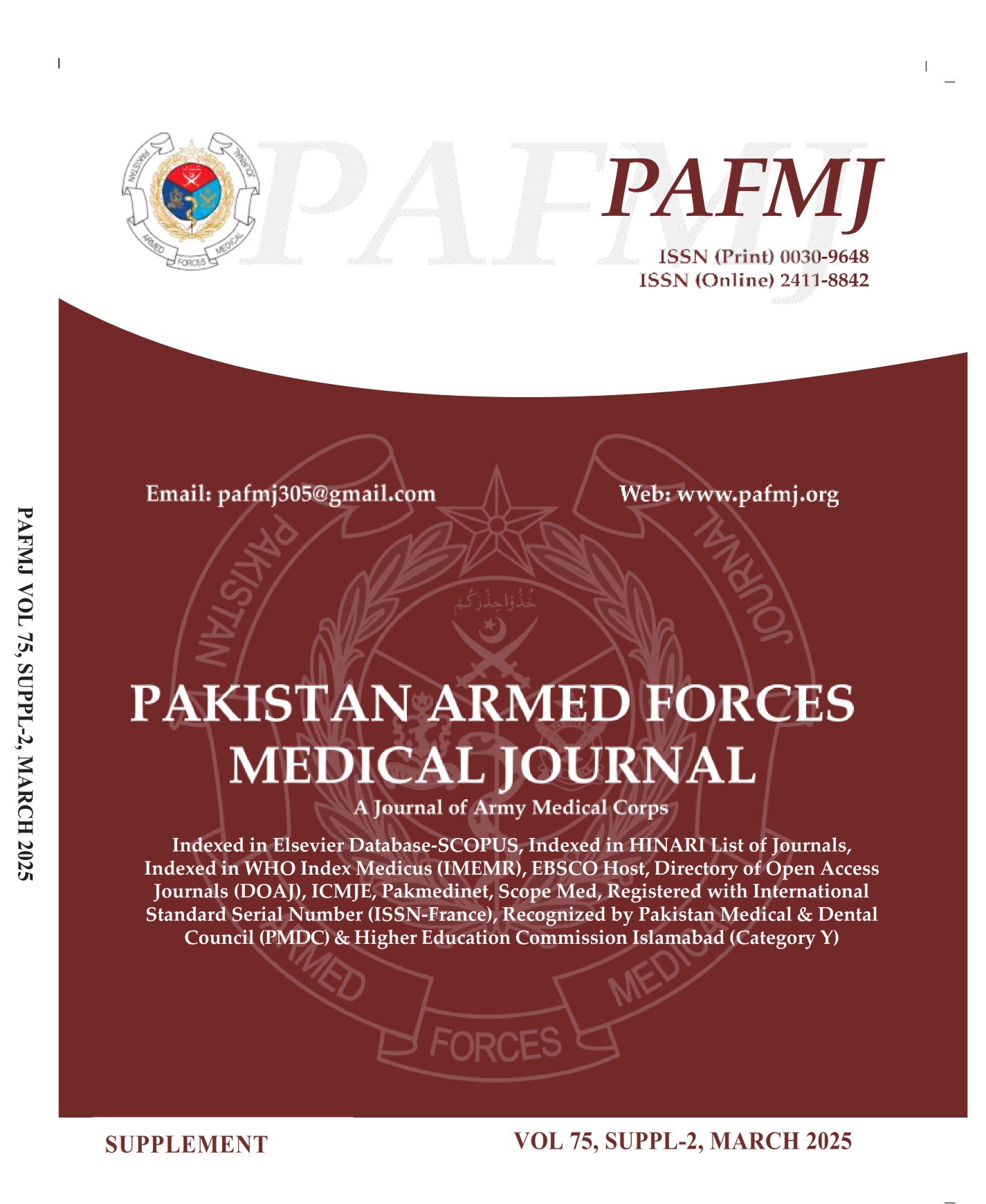Identifying the Lower Limit of Haemoglobin A2 in Individuals with Beta Thalassemia Trait
DOI:
https://doi.org/10.51253/pafmj.v75iSUPPL-2.8841Keywords:
Beta Thalassemia Trait, Haemoglobin A2, High Performance Liquid Chromatography, Polymerase Chain ReactionAbstract
Objective: To determine the sensitivity, specificity and diagnostic accuracy of High Performance Liquid Chromatography in the detection of β-thalassemia trait. To determine the lower cut-off limit of HbA2 in the detection of β-thalassemia trait by using High Performance Liquid Chromatography.
Study Design: Validation study.
Place and Duration of Study: Department of Haematology, Armed Forces Institute of Pathology, Rawalpindi Pakistan, from Aug 2021 to Mar 2022.
Methodology: A total of 243 patients with suspected β-thalassemia were included in this study. Inclusion criteria included patients with a mean corpuscular volume of less than 75 fl and a mean corpuscular haemoglobin of less than 25 pg. Those patients who had received blood transfusions within the past three months, had any other haemoglobinopathy, abnormal iron studies or β-thalassemia major were excluded.
Blood samples were obtained from all patients which were tested for the presence of HbA2 using High Performance Liquid Chromatography and genetic mutation of beta globin chain was confirmed by PCR methods. Data was analyzed by SPSS 26.0.
Results: Our patients had a mean age of 25.57±13.12 years with a female majority: 132(54.3%). A total of 132(54.3%) patients tested positive for β-thalassemia trait with a cut-off of 4.0% using HPLC, while 130(53.5%) tested positive for beta globin gene mutation using PCR. High Performance Liquid Chromatography was found to have a sensitivity of 96.2%, a specificity of 93.8% and a diagnostic accuracy of 95.1% with a cut-off of 4.0%. .....
Conclusion: High Performance Liquid Chromatography is an excellent modality for the....
Downloads
References
Needs T, Gonzalez-Mosquera LF, Lynch DT. Beta Thalassemia. In: StatPearls [Internet]. Treasure Island (FL): StatPearls Publishing; 2022 Jan.
Origa R. β-Thalassemia.Genet Med 2017; 19(6): 609-619.
https://doi.org/10.1038/gim.2016.173
Rameli N, Ramli M, Zulkafli Z, Hassan MN, Yusoff SM, Noor NHM, et al. Challenges in the Diagnosis of Beta-thalassemia Syndrome: The Importance of Molecular Diagnosis. Oman Med J 2022; 37(1): e331. https://doi.org/10.5001/omj.2021.48
Ebrahim S, Raza AZ, Hussain M, Khan A, Kumari L, Rasheed R, et al. Knowledge and Beliefs Regarding Thalassemia in an Urban Population. Cureus 2019; 11(7): e5268.
https://doi.org/10.7759/cureus.5268
Yilmaz Keskin E, Acar Ö, Özbas H. Missed Diagnosis of β-Thalassemia Trait in Premarital Screening Due to Accompanying HbA2-Yialousa (HBD: c.82G>T). J Pediatr Hematol Oncol 2021; 43(1): e103-e104.
https://doi.org/10.1097/MPH.0000000000001633
Sadiq MA, Muqeem A, Yusuf R, Bilal A. Frequency of beta thalassemia trait among the healthy individuals -- A single centre study. Pak Armed Forces Med J 2018; 68 (6): 1716-1719.
Mishra KK, Patel P, Bhukhanvala DS, Shah A, Ghosh K. A multiplex ARMS PCR approach to detection of common β-globin gene mutations. Anal Biochem 2017; 537: 93-98.
https://doi.org/10.1016/j.ab.2017.06.014
Higgins TN, Khajuria A, Mack M. Quantification of HbA2 in Patients With and Without β-Thalassemia and in the Presence of HbS, HbC, HbE, and HbD Punjab Hemoglobin Variants: Comparison of Two Systems. Am J Clin Pathol 2009; 131(3): 357-362. https://doi.org/10.1309/AJCP28QKSOPHYOBC
Vijian D, Wan Ab Rahman WS, Ponnuraj KT, Zulkafli Z, Mohd Noor NH. Molecular Detection of Alpha Thalassemia: A Review of Prevalent Techniques. Medeni Med J 2021; 36(3): 257-269.
https://doi.org/10.5222/MMJ.2021.14603
Yasmeen H, Toma S, Killeen N, Hasnain S, Foroni L. The molecular characterization of Beta globin gene in thalassemia patients reveals rare and a novel mutations in Pakistani population. Eur J Med Genet 2016; 59(8): 355-62.
https://doi.org/10.1016/j.ejmg.2016.05.016
Abdel-Messih IY, Youssef SR, Mokhtar GM, Elmogy MI, Mahmoud HM, Ayoub M, Pessar SA. Clinical to Molecular Screening Paradigm for β-Thalassemia Carriers. Hemoglobin 2015; 39(4): 240-6.
https://doi.org/10.3109/03630269.2015.1048808
Saleem N, Anwar A, Shahid NUA, Saleem R, Saleem Z, Asghar H, et al. Perception of Parents of Thalassemic Child to Thalassemia in Pakistan. Cureus 2021; 13(8): e17615.
https://doi.org/10.7759/cureus.17615
Chatterjee T, Chakravarty A, Chakravarty S. Population Screening and Prevention Strategies for Thalassemias and other Hemoglobinopathies of Eastern India: Experience of 18,166 cases. Hemoglobin 2015; 39(6): 384-388.
https://doi.org/10.3109/03630269.2015.1068799
Suman FR, Teja R, Magdalene J, Bisht T, Varadharajan S, Lakshmi U, et al. Screening for Beta Thalassemia Carrier State Among Women Attending Antenatal Clinic in a Tertiary Care Centre and Framing a Model Program for the Prevention of Beta Thalassemia. Cureus 2022; 14(2): e22209.
https://doi.org/10.7759/cureus.22209
Arshad M, Ahmed S, Ali N. Effect of Iron Deficiency on the Phenotype of β-Thalassaemia Trait. J Coll Physicians Surg Pak 2016; 26(3): 230-231.
Nosheen A, Inamullah AH, Qayum I, Siddiqui N, Abbasi FM, Din AU, et al. Premarital genetic screening for beta thalassemia carrier status of indexed families using HbA2 electrophoresis. J Pak Med Assoc 2015; 65(10): 1047-1049.
Nah EH, Cho S, Kim S, Chu J, Kwon E, Cho HI, et al. Distribution of hemoglobin levels and prevalence of anemia according to sex, age group, and region in 13 Korean cities. Int J Lab Hematol 2020; 42(2): 223-229.
https://doi.org/10.1111/ijlh.13160
Moafi A, Valian S, Nikyar Z, Zeinalian M, Momenzadeh M, Rahgozar S, et al. Prevalence of minor b-thalassemia based on RBC indices among final suspected individuals in premarital screening program referred to genetic laboratories. Int J Hematol Oncol Stem Cell Res 2010; 4(1): 23-27.
Aslan D. Automated blood counts and identification of thalassemia carriers. J Postgrad Med 2008; 54(1): 242-243.
Hussain Z, Malik N, Chughtai A. Diagnostic significance of red cell indices in b thalassemia trait. Biomedica 2005; 21: 129–131.
Thong M, Soo T. The spectrum of b-globin gene mutations in children with b-thalassemia major from Kota Kinabalu, Sabah, Malaysia. Singapore Med J 2005; 46(7): 340-343.
Shan-e-Rauf, Shamshad GU, Mushtaq F, Khan SA, Ali N. Diagnosing Beta Thalassemia trait in a developing country. Acta Haematol Pol 2017; 48: 18.
Weatherall DJ, Clegg JB. The laboratory diagnosis of the thalassaemias. In: Weatherall DJ, Clegg JB, Eds. The Thalassaemia Syndromes, 4th ed. Oxford, UK: Blackwell Science 2001: 686–723
Downloads
Published
Issue
Section
License
Copyright (c) 2025 Muhammad Waleed Ahmed, Fahim Akhtar, Manzar Bozdar, Eisha Mansoor, Saima Zahir, Saima Shafait

This work is licensed under a Creative Commons Attribution-NonCommercial 4.0 International License.















